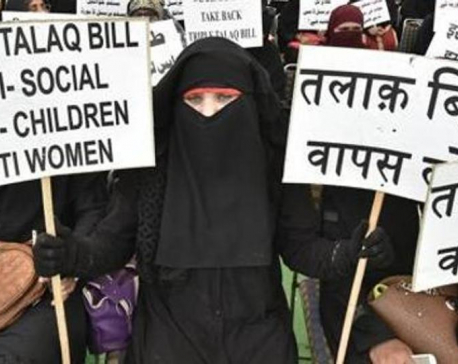
OR
Poor, ethnic groups and Muslims use least family planning measures: FWD
Published On: March 19, 2019 05:30 AM NPT By: Republica | @RepublicaNepal
KATHMANDU, March 19: Only 48 percent of the targeted groups of the population use family planning measures despite the government spending about Rs 500 million annually, according to the Family Welfare Division (FWD) under the Department of Health Services.
The 2016 Nepal Demographic and Health Survey (2016 NDHS) shows that the total fertility rate for the three years preceding the survey is 2.3 births per woman, a decline from 2.6 children in 2011. However, 24 percent of married women of reproductive age have an unmet need for family planning though they want to space or limit births but are not using contraception.
The use of contraceptives is the highest in Province 3 - 49 percent, while it is the lowest in Province 4 - 37 percent, according to government reports.
“Poverty, practices of ethnic groups and beliefs of Muslims are major reasons behind the people not using family planning measures,” said Dr RP Bichha, chief of the FWD. “Fifty-two percent of the population aged between 25 and 49 years still do not use family planning measures. The number of people aged between 15 and 25 is higher among the poor, ethnic groups and the Muslim community,” he added. “Though some Muslims us contraceptives, they do not reveal it because of their religious beliefs which don't entertain family planning.”
According to the NDHS 2016, on the overall, 53 percent of currently married women use methods of family planning, with 43 percent using modern methods and 10 percent using traditional methods. Female sterilization is the most commonly used method (15%), followed by injectibles (9%), male sterilization (6%), and the pill (5%). Only 15 percent of currently married women aged 15 to 19 use a modern method of contraception.
Three out of every five women who began using a contraceptive method in the 5 years before the survey discontinued the method within 12 months. The most common reason for discontinuing a method is the husband being away (47%), followed by side effects or health concerns (18%) and the desire to become pregnant (13%), according to the MoHP. Some Rs 500 million is annually spent on the family planning programs in the country.
In a bid to raise awareness on family planning measures for reaching out to the unreached, the government organized a two-day summit beginning from Monday, spending Rs 6 million, in Kathmandu.
You May Like This

UML leader Basnet to Balen: Don't be pampered just because you have a few hundred fans on Facebook
KATHMANDU, August 26: While the Mayor of Kathmandu Metropolitan City (KMC), Balendra Shah, is speeding up the work to demolish... Read More...

Muslims at haj gather on Mount Arafat to atone for sins
ARAFAT, Aug 10: Two million Muslims gathered at Saudi Arabia’s Mount Arafat on Saturday amid the summer heat and regional... Read More...

Triple talaq: India criminalises Muslim 'instant divorce'
NEW DELHI, July 30: India's parliament has approved a bill that makes the Muslim practice of "instant divorce" a criminal... Read More...



Just In
- World Malaria Day: Foreign returnees more susceptible to the vector-borne disease
- MoEST seeks EC’s help in identifying teachers linked to political parties
- 70 community and national forests affected by fire in Parbat till Wednesday
- NEPSE loses 3.24 points, while daily turnover inclines to Rs 2.36 billion
- Pak Embassy awards scholarships to 180 Nepali students
- President Paudel approves mobilization of army personnel for by-elections security
- Bhajang and Ilam by-elections: 69 polling stations classified as ‘highly sensitive’
- Karnali CM Kandel secures vote of confidence















Leave A Comment